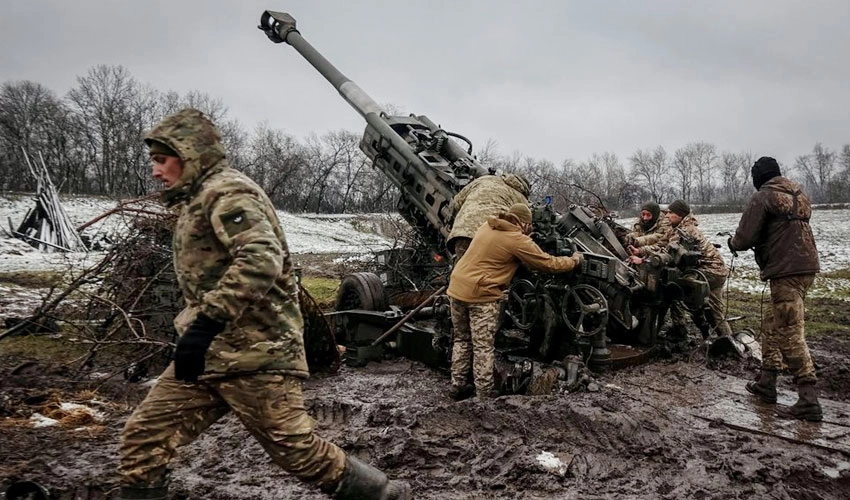Ukraine warns of more Russian attacks as fighting rages in Donetsk

LVIV/KYIV (Reuters) - Ukrainian President Volodymyr Zelenskiy cautioned on Sunday that Russia was "planning new strikes" on his country, urging defence forces and citizens to be prepared to withstand a new week of strain on the power grid amid freezing temperatures.
Moscow has targeted vital infrastructure in recent weeks, sparking power outages and killing civilians. Strikes last Wednesday caused the worst damage so far in the nine-month conflict, leaving millions without light, water or heat as temperatures fell below 0 Celsius (32 Fahrenheit).
"We understand that the terrorists are planning new strikes. We know this for a fact," Zelenskiy said in his nightly video address on Sunday. "And as long as they have missiles, they, unfortunately, will not calm down."
The coming week could be as difficult as the previous one, he added.
There was no response from Moscow to Zelenskiy's claims.
In Kyiv, snow fell and temperatures hovered around freezing on Sunday as millions in and around the Ukrainian capital struggled with disruptions to electricity supply and central heating caused by the waves of Russian air strikes.
City authorities said workers were close to completing restoration of power, water and heat, but high consumption levels meant some blackouts had been imposed.
The Kremlin last week denied its attacks on Ukraine's electricity network were aimed at civilians, but said Kyiv could "end the suffering" of its population by meeting Russia's demands to resolve the conflict.
Russia annexed swaths of Ukraine's east and south in September and President Vladimir Putin said Moscow's territorial demands are non-negotiable. After the annexation, Zelenskiy said he would not negotiate with Moscow and that Ukraine's territorial integrity cannot be negotiated.
Sunday was relatively calm with no devastating attacks on Kyiv or other major cities. Ukraine's central army command said Russian forces launched four missile attacks and fired multiple times on civilian objects in the Dnipropetrovsk region.
The situation, however, remained intense along front lines in various parts of Ukraine, particularly in the eastern Donetsk region, Zelenskiy said.
The General Staff of Ukraine's Armed Forces said in its daily update on Monday that Ukrainian forces had repelled Russian attacks in several areas, including Bakhmut and Avdiivka, in the Donetsk region over the past 24 hours.
Ukrainian military analyst Oleh Zhdanov said heavy fighting was also going on in the northeastern Kharkiv region, near areas recaptured by the Ukrainian army in September and October.
ATTACKS ON ENERGY
Russian attacks have increased in recent weeks, with repair workers racing to fix wrecked power facilities as the cold weather boosts energy demand.
Zelenskiy said utility and emergency teams were working around the clock to provide power, with the situation "under control" though most regions were subject to scheduled blackouts to help restore the grid.
In Kherson, a city in southern Ukraine abandoned by Russian troops this month, regional governor Yaroslav Yanushevych said 17% of customers now had power. Other districts would be connected in coming days.
Sergey Kovalenko, chief operating officer of YASNO, which provides energy to Kyiv, said on Saturday evening the situation in the city had improved but remained "quite difficult".
Zelenskiy criticised Kyiv Mayor Vitali Klitschko, saying he had not done enough to help beleaguered residents. Klitschko, a former professional boxer, replied that political infighting was "senseless" amid Russia's military campaign.
The head of Ukraine's state-run nuclear energy firm said on Sunday there were signs that Russian forces might be preparing to leave the vast Zaporizhzhia nuclear power plant which they seized in March. Repeated shelling around the plant has spurred fears of a nuclear catastrophe.
"One gets the impression they're packing their bags and stealing everything they can," Petro Kotin, head of Energoatom, said on national television.
According to the General Staff, Ukraine's forces on Saturday destroyed six units of military equipment of various types and about 30 servicemen were injured in the area of the occupied Enerhodar city, where many of the nuclear plant's workers live.
The Russian-backed administration of the region said the nuclear power plant remained under Russian control.
"The media are actively spreading fakes that Russia is allegedly planning to withdraw from Enerhodar and leave the (nuclear plant). This information is not true," the Russia-installed administration of Enerhodar said.
Reuters could not immediately verify the reports.
Separately, the Pentagon is considering a Boeing proposal to supply Ukraine with cheap, small precision bombs fitted onto abundantly available rockets, allowing Kyiv to strike far behind Russian lines.
Boeing's proposed system, dubbed Ground-Launched Small Diameter Bomb, is one of about a half-dozen plans for getting new munitions into production for Ukraine and America's Eastern European allies, industry sources said.







